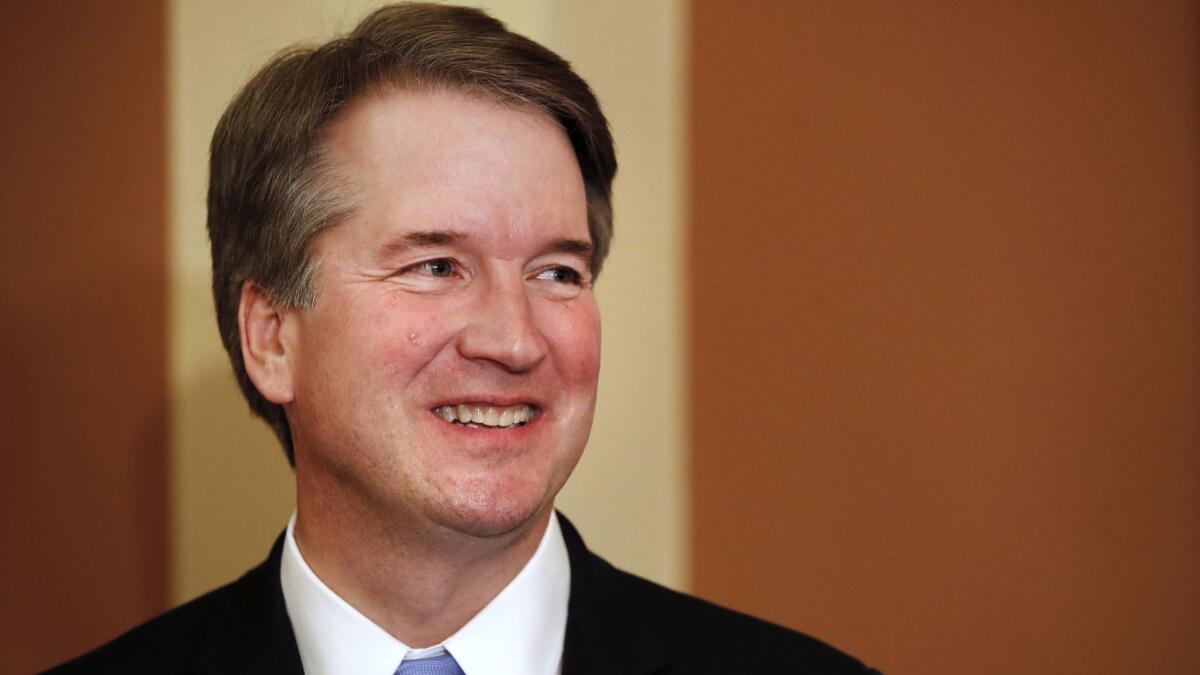Op-Ed: Trump’s Supreme Court might overturn a doctrine, but that won’t destroy the ‘administrative state’

- Share via
Mere months ago, most practicing lawyers probably couldn’t have defined the Chevron doctrine, even if they had some vague recollections of it from law school.
Now, Chevron’s everywhere. That’s because President Trump’s choices for Supreme Court justices — Neil M. Gorsuch, already on the high court, and Brett Kavanaugh, nominated — have made it clear that they aren’t fans of the doctrine. If Kavanaugh and Gorsuch have their way, warn some worried observers, the doctrine will fall and Washington will be radically, irrevocably changed.
The end of the Chevron doctrine would “severely curtail the ability of future government[s] to meet the needs of the people,” according to a post on the legal website Verdict. It would amount to “clear disdain for how government affects and improves the lives of regular Americans every day,” in the words of USC law professor Franita Tolson.
If a court agrees with the agency’s understanding, the result would be no different from the result under today’s Chevron regime.
These fears are out of proportion to the threat. They confuse the demise of a doctrine of statutory interpretation with the demise of the regulatory and administrative agencies themselves.
The Chevron doctrine is named for a 1984 Supreme Court decision, Chevron U.S.A. Inc. vs. Natural Resources Defense Council, in which the justices were confronted with a puzzling question about whether the Environmental Protection Agency under President Reagan could apply more lenient standards to enforcement of the Clean Air Act than the standards previously applied by President Carter’s EPA. They ultimately found the approach of Reagan’s EPA to be lawful. (The archives of their correspondence indicate that it wasn’t an easy decision.)
What emerged as the Chevron doctrine, then, was this principle: When a statute delegates interpretive authority to an administrative agency and the statute’s language is ambiguous or vague, courts should defer to a reasonable understanding of that statute arrived at by the agency.
Deference often makes sense. Agencies are filled with experts who understand the nuances of the statutes assigned to them for implementation. Interpreting the laws can involve policy decisions that are better made by officials accountable to the elected president than by unelected judges. And — as Justice Antonin Scalia said in a 1989 speech — because Congress wrote these types of statutes with the expectation that agencies would resolve any ambiguities, courts should honor that intent.
Many judges and administrators find the Chevron doctrine useful: Judges (sometimes) like deferring to agencies on complicated interpretive questions, and administrators (often) like being on the receiving end of that deference because of the greater leeway it provides them.
However sensible the doctrine is, it isn’t the only foundation for the “administrative state” — the sizable bureaucracy that implements the laws that regulate so many facets of modern life. The EPA, the Federal Communications Commission, the Securities and Exchange Commission and their like do not rely on Chevron for their very existence.
The doctrine is a guide for a relatively narrow set of circumstances, at least when it is applied correctly: If a court finds a statute to have delegated interpretive authority to an agency, and if the court deems the statute ambiguous or vague, then the court is to defer to the agency’s interpretation, so long as the court deems it reasonable. (Agencies already operate without receiving Chevron deference in a wide range of circumstances.)
Enter the Fray: First takes on the news of the minute from L.A. Times Opinion »
What would happen if the Chevron doctrine were to disappear? Courts would simply do what they do in other circumstances in which they’re confronted with questions of statutory interpretation: Start from their best readings of the statute’s plain text and structure, then apply long-standing legal maxims to decide what it means. If a court agrees with the agency’s understanding, the result would be no different from the result under today’s Chevron regime. If it doesn’t agree, then in a post-Chevron era the court’s interpretation would prevail as it does in other contexts.
Joshua Matz, in a post on his Take Care website, argues that, if Chevron were to fall, “courts would exercise far greater authority over the meaning of federal law.” That is surely correct, but determining the meaning of federal law is what courts do every day. Upending Chevron could also, as Matz says, have “major practical implications” by elevating uncertainty about which agency interpretations will withstand judicial scrutiny. Combined with other developments such as the shift toward politically appointed administrative law judges, the stakes loom large for disrupting at least some decision making in government agencies.
Fundamentally, however, the Chevron doctrine cannot and should not be equated with the administrative state itself. To suggest that the potential demise of the former means the dismantlement of the latter isn’t sound legal analysis — it’s political hyperbole. If Chevron falls, government as we know it won’t disappear.
Joshua A. Geltzer is the founding executive director and visiting professor of law at Georgetown University Law Center’s Institute for Constitutional Advocacy and Protection.
Follow the Opinion section on Twitter @latimesopinionand Facebook
More to Read
A cure for the common opinion
Get thought-provoking perspectives with our weekly newsletter.
You may occasionally receive promotional content from the Los Angeles Times.






